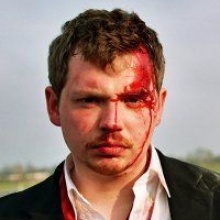
"Using cars to change the world," is one of the mottos of the South Korean automobile manufacturer Hyundai, which produces 300,000 cars each year with the help of the inhabitants of the Czech village Nosovice. The factory looks like it came from another planet, the car park and the huge drab shoeboxes contrasting shrilly with the rolling green hills that surround them. Once, the local people grew cabbages here. Now, the villagers employees must get used to the Korean's strict working regime and perform monotonous tasks in the factory. They spend their days at the conveyor belt all day with barely a break. The previous owners of the land, farmers, were subjected to huge pressure, including death threats, to sell their fertile agricultural land bordering a nature reserve to the factory, sometimes for as little as €4000. One of the landowners resists to the last and erects a statue made of rusty car parts and a copy of a letter containing a death threat.

Vit Klusak was born in 1980. Graduate of the Department of Documentary Film at FAMU, Prague, since 2005 he has been teaching in the same department (“Film Narration” seminar). He studied photography at the Industrial Graphic Arts School in Prague and has had two solo shows of photography. At present he is preparing a black comedy film My Three Brothers based on the fairy tale of the same name by the Czech writer Karel Jaromir Erben. Vit Klusak runs the independent production company Hypermarket Film Ltd.
Origin of the World (1999), Digestive (2000), Jazz War (2001), Heaven (2003), Czech Dream (2004), Intermission (2006), Czech Peace (2010)